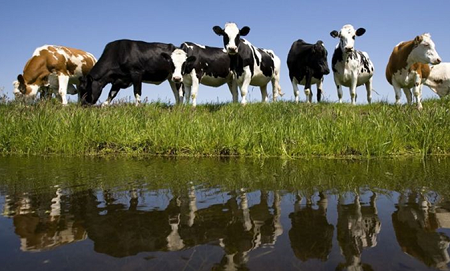Climate-CAFE
Farming systems for adaptation to climate change

“In Climate-CAFE, we use an interdisciplinary approach to evaluate traditional and novel regional adaptation and mitigation strategies along a North-South climate gradient in the EU. Together with farmers we aim to find strategies that are relevant in the short term, as well as enable adaptation to climate change as predicted by the Intergovernmental Panel on Climate Change (IPCC) scenarios in 2050 and 2100.”
Climate-CAFE is a multilateral research project that focuses on analysis and re-design of farming systems for adaptation to climate change. It combines working with arable and dairy farmers in so-called Adaptation Pilots across Europe with modelling of consequences of projected climate effects in 2050 and 2100. The European dimension of the consortium provides added value for both researchers and practitioners by enabling sharing of knowledge, expertise and experience among the 9 participating countries. Climate-CAFÉ started under the ERA-NET PLUS Action “Climate Smart Agriculture”, initiated by FACCE-JPI.
Several prospective studies have shown that climate change will affect European agriculture, although with major differences among the countries and geographical regions. Changes in means and extremes of temperature or rainfall are expected to impact the development of crops and the functioning of the agro-ecosystem, such as the speed of nutrient cycling, thereby affecting crop performance. The project Climate-CAFE was set up to find strategies to increase the adaptive capacity of arable and forage crops to climate change. Walter Rossing, researcher at Farming Systems Ecology of Wageningen University is one of the three Dutch participants in Climate-CAFE, which also include the Louis Bolk Institute and the research and advice agency NMI. “The combination of a university group with partners that can work more closely with farmers allows bringing together different types of knowledge to enhance farmers’ adaptive capacity”, states Rossing. This is very much in line with the current thinking at the Ministry of Economic Affairs which funds the Dutch part of the project.
Adaptation pilots
The aim of the adaptation pilots is to identify farmer perceptions of the need and the means for climate change adaptation, and where possible test adaptation strategies on farms by combining farmer and science-based insights. The relative effectiveness of the adaptation strategies for adaptation to climate change will be evaluated using long-term simulations and multi-criteria analyses, which will inform the dialogue in the pilots.
“For the pilots we approached arable farmers and dairy farmers who were interested in changing their production systems to become more robust to variation in economic and weather-related influences by increasing the ecological self-reliance of their farms. The pilots are based on the major regional cropping and farming systems located in the consortium countries”, says Rossing. “In the first year of the project, we synthesised and analysed existing data from long-term experiments and knowledge of advisors and farmers to propose measures for adaptation pilots in the next two years.”
The expected results of the Climate-CAFE project are: i) an overview of potential CC adaptation measures in accordance with farm constraints, ii) simulation of adaptation measures and their ranking in terms of efficiency and costs, iii) simulation of the impact of IPCC scenarios 2050 and 2100 in interaction with adaptation measures on European agriculture production for a wide range of EU countries representing a North-South climate gradient in Europe.
Collaboration
Wageningen University and Research was among the initiators of the Climate-CAFE project. “After the first partners joined our initiative, we saw an immediate knock on effect and we now have 16 partners from 9 FACCE member countries”, states Walter Rossing, “I knew most of the partners, but we had never worked together in a research project before. The consortium appears to be a good match of knowledge, expertise and experience and will enable us to create an inspiring setting for thinking about re-designing farming systems adapted to climate change. Moreover, the consortium authored a Horizon 2020 proposal on climate adaptation."
Policy makers in the spotlight with joint programmes
Joint programming is about aligning research & research funding. At the policy level, this includes finding and assembling national priorities into a common research agenda, shared and supported by the national governments involved. In a series of interviews, Dutch policy-makers and funders, as well as researchers from Wageningen University and Research present their part in the joint programming process.
